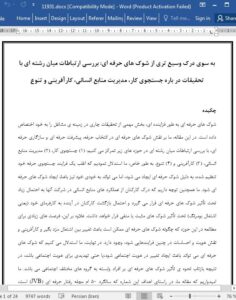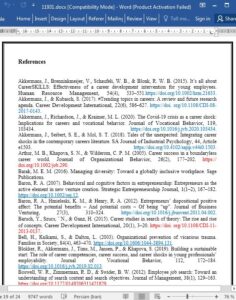Abstract
Career shocks have become an increasingly important part of current careers scholarship. In this article, we focus on the role of career shocks in career choice, career development, and career adaptation by exploring interdisciplinary connections with the domains of: (1) job search, (2) human resource management, (3) entrepreneurship, and (4) diversity. Specifically, we argue that a self-regulated job search process is likely often triggered by a career shock, yet could also trigger career shocks in its own right. We also note that employees' perceptions of the HR practices in their company are likely influenced by career shocks, and that the chance of employees to return to their employer in the future (i.e., boomerang employment) is affected by the occurrence of positive or negative shocks. Furthermore, there are ample opportunities to study how career shocks may trigger transitions between paid employment and entrepreneurship, and the role of identity and emotions in such processes. Finally, we argue that career shocks may instigate changes in the salience of social identity or even constitute threats to social identity, thereby reflecting on how career shocks may differentially impact people belonging to different social groups. We hope that our article, in the spirit of this JVB 50-year anniversary issue's aims, will inspire scholars both within and outside of the field of career studies to better understand how career shocks may impact the way in which people work and develop their careers.
The Journal of Vocational Behavior (JVB) 50-year anniversary issue aims to provide inspiration for the future of the field of career studies and vocational behavior by looking at its rich past to formulate directions for innovative new research. JVB focuses particularly on “the fields of career choice, career development, and work adjustment across the lifespan.” At the heart of research on such topics is the role of major career events that shape people’s careers. Indeed, in JVB’s very first volume, Hart et al. (1971) highlighted the important role that chance plays in occupational entry, arguing that vocational theory and counseling should take into account the role of unplanned situational events. Career events have remained part of research published in JVB ever since. For example, Salomone and Slaney (1981) found that individuals tend to report an interplay between chance events and their own personal characteristics and skills. They argued that studying chance in itself may not be effective, as it is the combination between a career event and how an individual deals with that event, that actually creates career impact. Typically, studies on career events in JVB focused on establishing the prevalence of such events in career decision making (e.g., Bright et al., 2005; Hirschi, 2010), and the role of shock events in turnover (e.g., Holtom et al., 2012; Maertz & Kmitta, 2012).









